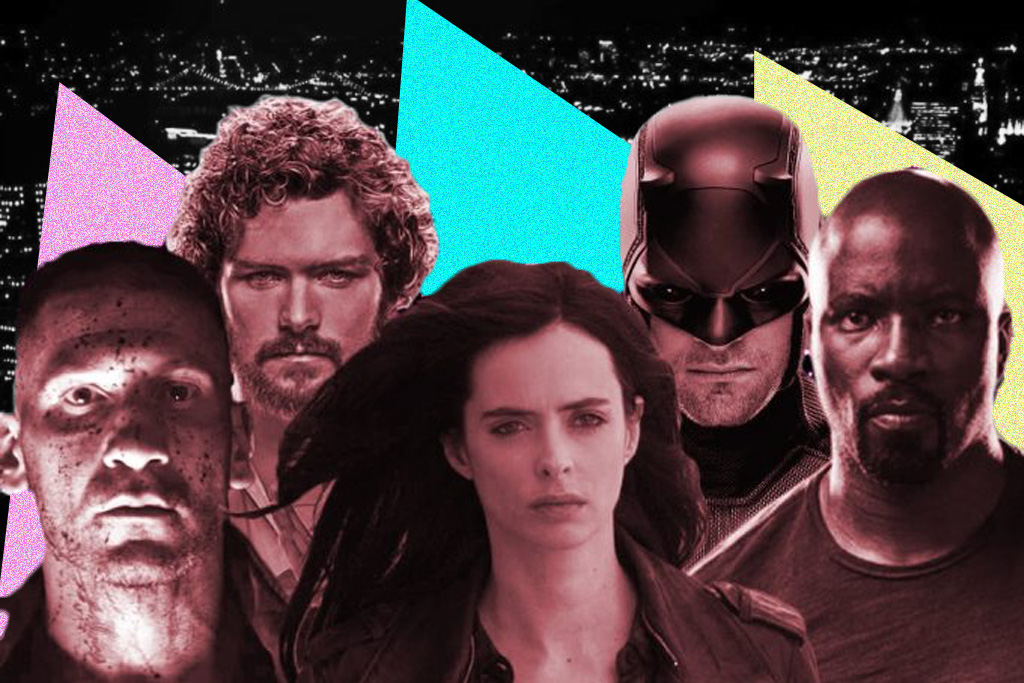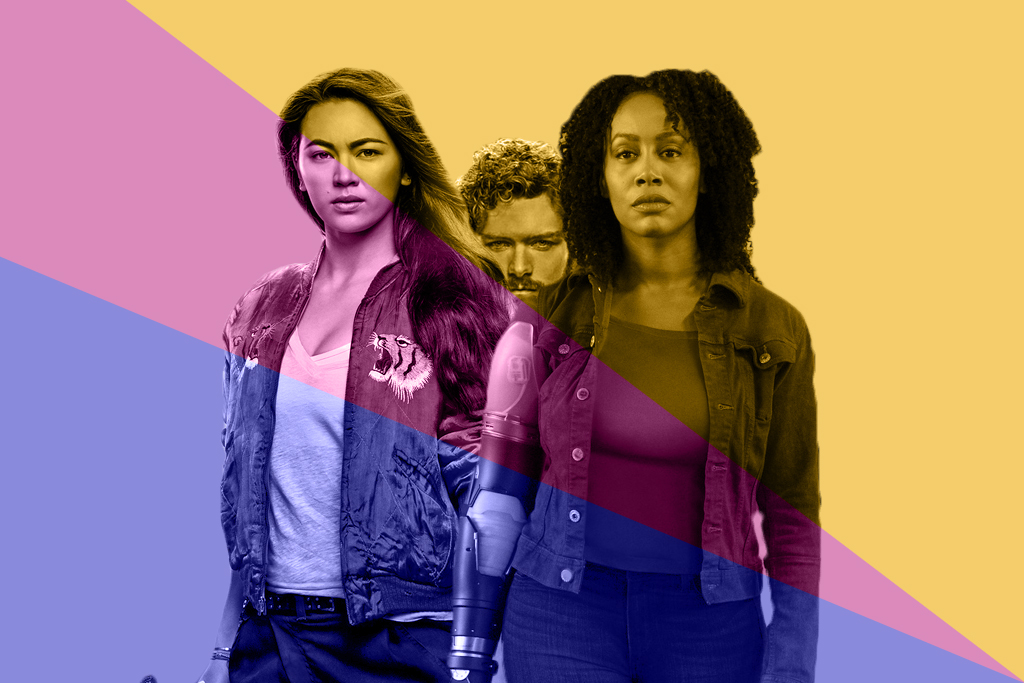Netflix’s Attempts At Marvel Heroes Had So Much Potential, So What Went Wrong?
From 'Daredevil' to 'Iron Fist', Netflix's heroes definitely ranged in quality.

The Netflix Marvel universe is no more.
After four years and 13 seasons, the streaming giant and Disney-owned comic book juggernaut have parted ways. This separation has been on the cards, but the arrival and end of Jessica Jones Season 3 officially conclude its run.
As the curtain comes down on the brief collaboration between two entertainment heavyweights, though, a timely question presents itself: Did Netflix do justice to these iconic heroes?
With the Marvel Cinematic Universe’s growing success in its embryonic years, culminating with 2012’s critically acclaimed The Avengers, it was only a matter of time before superhero team-ups made the transition from big to small screen.
An “unprecedented deal” — struck between Netflix and Disney in November 2013 — allowed the streaming giant to build an MCU-style universe within a gritty fictionalised Hell’s Kitchen.
The initial five-series deal consisted of standalone series for Daredevil, Jessica Jones, Luke Cage, and Iron Fist, before the iconic supergroup The Defenders was formed in an eight-part miniseries.
Not All Heroes Are Created Equal
The critical reception that met each individual series was as broad as they come.
Daredevil Season 1 achieved the highest rating of all with 99%, while Iron Fist Season 1 brought up the rear with a mere 20%. Such contrasting ratings could have prompted Netflix to end its association with Marvel after the latter’s March 2017 release.
With eight more series released after, however, approval ratings weren’t the sole reason for this severance of ties.
These polarising numbers can’t simply be placed at each season’s showrunners’ feet either. After all, most MCU films have been helmed by different directors and only two — Thor: The Dark World and The Incredible Hulk — have failed to achieve a rating above 70%.
Netflix’s decision to drop these shows must have stemmed from a bigger problem. Ironically, it was the MCU that would have a major bearing on the future of Netflix’s superhero universe.
The MCU Effect
It is paradoxical to think that the Marvel Cinematic Universe would be the inspiration and downfall for Netflix’s Marvel universe.
Yet it was the lack of ties to the MCU that has been one of the biggest criticisms levelled at the Defenders-verse.
Despite Daredevil, Jessica Jones et al. existing in the same universe as Iron Man and Captain America, references to MCU events are as rare as Vibranium. The Avengers’ Battle for New York and the Raft — the underwater prison seen in Captain America: Civil War that houses dangerous super-powered people — are the only links that Netflix’s universe had to the MCU.
That’s a far cry from other Marvel TV shows.
Other franchises, including Hulu’s Runaways, ABC’s cancelled Inhumans, and Freeform’s Cloak & Dagger, aren’t affected by the MCU’s events, as they aren’t set in New York and have no ties to the Chitauri Invasion.
The problems for Netflix’s Marvel universe arose from the existence of Agents of S.H.I.E.L.D and Agent Carter.
Both shows were set in New York and dealt with the fallout from certain MCU events. Agent Carter was set in the immediate aftermath of Captain America: The First Avenger. Agents of S.H.I.E.L.D, meanwhile, explored the ramifications of S.H.I.E.L.D’s destruction following The Winter Soldier and the Sokovia Accords introduced in Civil War.
If that duo hadn’t existed, the Defenders-verse would have had a case for being independent from the MCU.
In loosely tying them to the movies and, by default, these two shows, Netflix showed that they existed in the same reality. As such, its own shows suffered.
It was a disservice to these characters that they couldn’t explore the consequences of the movies like Agents of S.H.I.E.L.D did, especially when its heroes have significant relationships with prominent MCU superheroes in the comics.
It became a stick with which to beat Netflix with, and did little to help the universe’s inevitable end.
Adapting Iconic Characters From Comic To Screen
If Netflix failed to deliver on the credibility of its world existing as part of the MCU, it succeeded in capturing the essence of Hell’s Kitchen’s darker themes, and each hero’s powers, motives, and fears.
In developing its universe away from Disney’s family-friendly ethos, Netflix was able to delve into the more mature elements of the comics.
In Jessica Jones’ psychological torture at the hands of Kilgrave, or Dardevil’s difficult relationship with his religious beliefs, or the politicking in Luke Cage, Netflix explored uncomfortable themes and provided serious talking points about real-world problems.
These helped to ground Netflix’s Marvel heroes in realism, even if they were superpowered vigilantes.
Speaking of superpowers, each hero’s comic book abilities were adapted faultlessly. Save for Jessica Jones’ ability to fly being replaced with the power to jump great distances, the characters’ unique powers are maintained.
Their origin stories were kept true to the comics too, apart from a couple of nuances in the arcs of Jessica Jones and The Punisher.
Despite these near-perfect adaptations, this universe wasn’t to last. The rapid rise of streaming services meant that it wouldn’t be long before Disney entered the fray. It was a matter of when, and not if, Disney would want to develop Marvel TV programmes in-house, and lead to the cancellation of Netflix’s Defenders-verse, and so it proved late last year.
The Future Of The Defenders
The official announcement of Disney+ in November 2018 heralded the end of Netflix’s and Marvel’s collaboration.
Netflix had already cancelled Luke Cage and Iron Fist by this point as rumours circulated about Disney’s desire to launch its own streaming service. Daredevil, The Punisher, and Jessica Jones were soon to follow, and with the release of Jessica Jones Season 3 on 14th June, Netflix’s Defenders-verse was no more.
It’s unclear what the future holds for these iconic Marvel heroes. Disney is already producing shows starring Loki, Falcon and the Winter Soldier, and Scarlet Witch and Vision, but there’s no word on whether The Defenders can be resurrected as part of its streaming plans.
Reports last December revealed that, due to contractual reasons, Disney can’t develop series based on these heroes for two years after their cancellations. That, coupled with the NSFW aspects of these characters, means that hopes of seeing similar shows on Disney+ are unlikely.
So, Did Netflix Do Justice To Marvel’s Iconic Heroes?
Netflix might feel sore over Disney’s and Marvel’s decision to sever ties with them.
You only need to look at how accurate these heroes and the worlds was adapted, and the critical acclaim that greeted most series, to get an insight into how popular they were among Netflix’s userbase.
Ultimately, however, Netflix’s Marvel TV universe can be considered a success.
There were negatives — distancing its universe from the MCU being a chief criticism — but there was plenty to love about their Defenders-verse. The casting, action sequences, exploration of mature themes, and crossover fan service is something even Disney can look to replicate with its own original shows.
It might be over, but Netflix’s universe is the marker by which future Marvel shows should be judged.
